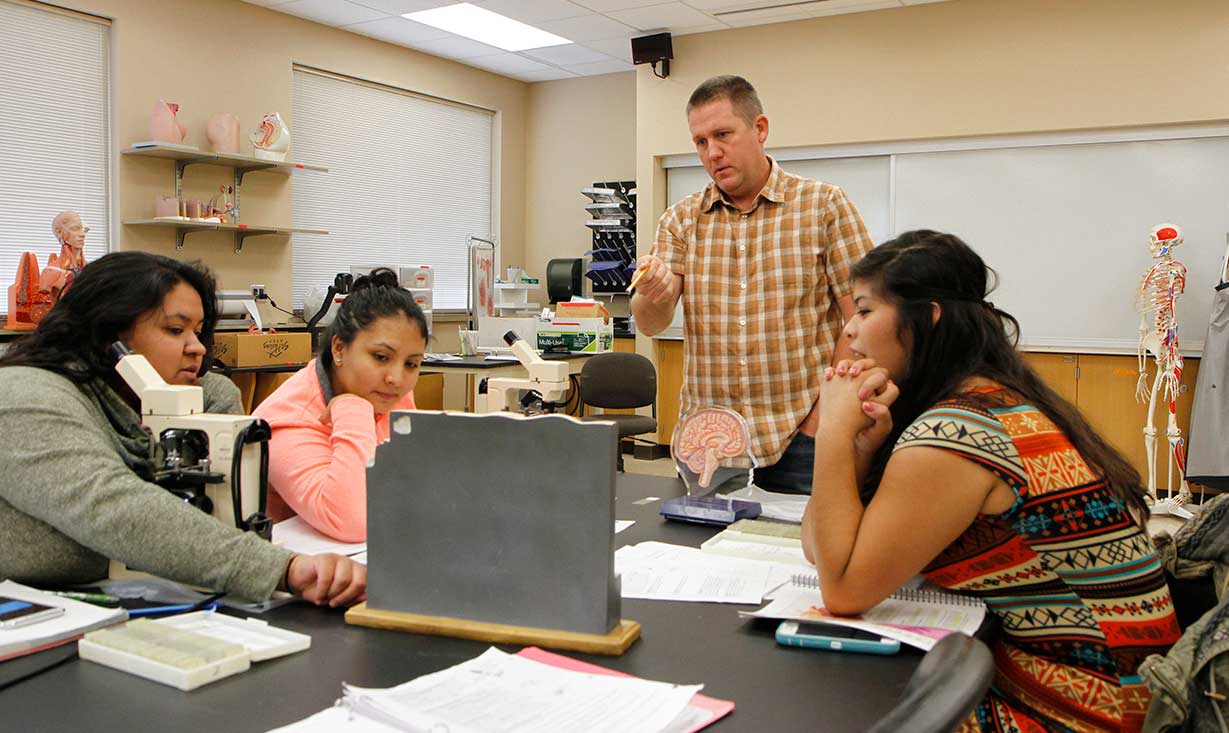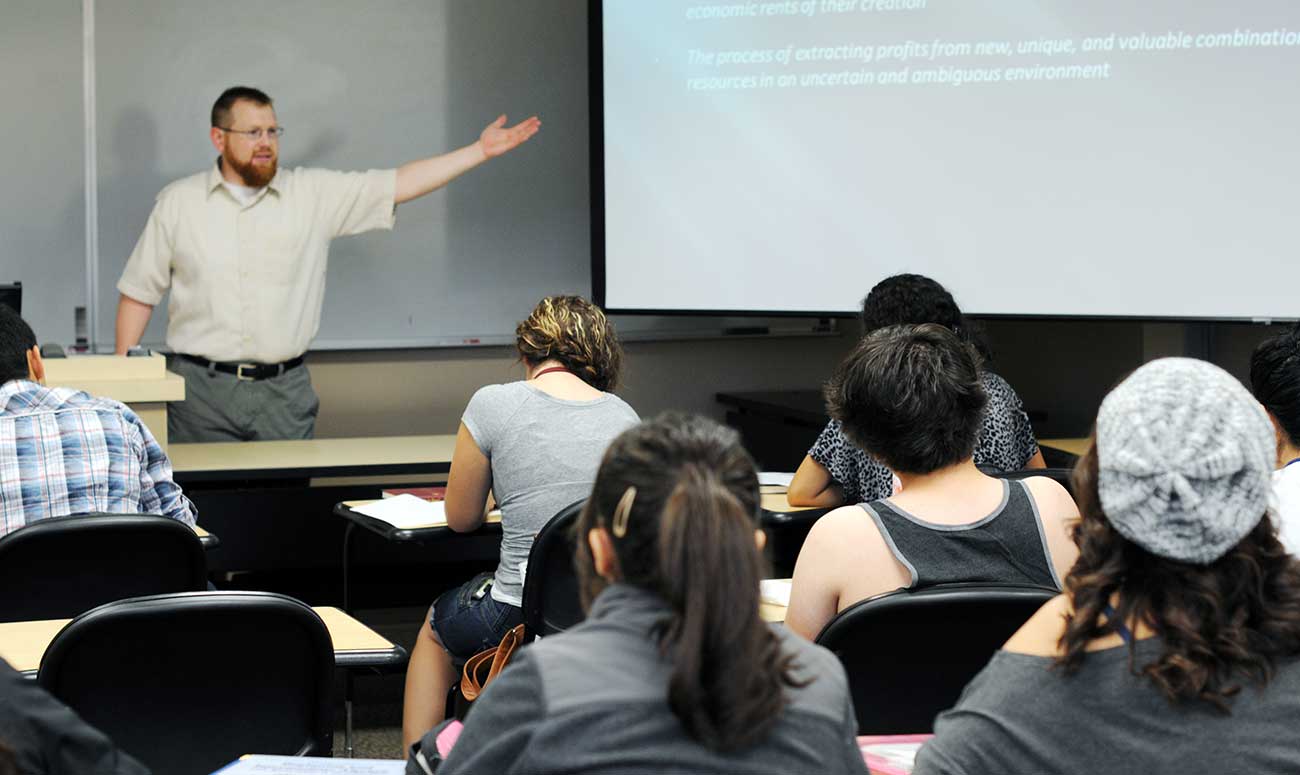YVC instructors create open-source materials for students
Open-source textbooks and materials that are free for anyone to use are a rising trend at colleges and universities across the state and country. Recently, a number of Yakima Valley College instructors have joined in efforts to make college more affordable for students while also creating materials that improve student learning.
During Spring 2022, Biology Instructor Jeremy Buegge spent his sabbatical creating a variety of materials, known as open educational resources, for his general biology (BIOL 160) course. Buegge created a textbook, “Cell Biology for Humans,” and 54 videos to accompany the book. He also created demonstration videos to help students get the most out of the textbook and video material.
“Most textbooks are not very readable,” says Buegge, whose original intent was to reorganize already produced material available from the OpenStax website — a repository of open-source material available to college students.
“However, when I really sat down and started reading [the material] from a student’s perspective, I found it to be difficult to get through. So, I started from the beginning and wrote my own.”

Buegge also wanted material that contained all the information that YVC uses in its general biology course. He focused on creating videos, noting that they can help students learn more effectively and seemed like a natural thing to do after the pandemic.
Buegge says that the new materials help students understand biology better and be better prepared for future anatomy and physiology courses. So far, he’s used the material in three fall quarter classes and in two winter quarter classes.
The book includes helpful sections with key terms, foundations, why the material is important, key details, diagrams, video links, and stop and think boxes for students to check their understanding of the concepts presented in each section. There is also a section with learning objectives that focuses on the key concepts for each chapter — something Buegge thinks is important for students preparing for quizzes and exams.
“By making my own content, I can use the most current and relevant resources for each topic.”
— Stephanie Ahlgren, nutrition instructor
Buegge says the biggest reason he sees instructors switching to open-source material is the cost and the potential to save students a significant amount compared to traditional textbooks. By removing the cost barrier of textbooks more students are able access education and learning.
Buegge’s recent efforts are part of a trend for YVC’s biology department which, according to Instructor Matthew Loeser, began utilizing open source textbooks for the BIO 160, 241 and 242 courses in 2018. Now, approximately 250 students each quarter benefit from the reduction in costs for these courses alone — collectively saving them thousands of dollars.
With more than 50% of YVC students coming from low-income households and nearly 80% of students receiving some form of grants, scholarships or other aid, the need to search out and create affordable learning materials for students in the Yakima Valley is significant.
A growing trend
Another YVC instructor creating open resource materials for her classes is Stephanie Ahlgren, who teaches nutrition and consumer health courses. Ahlgren uses SoftChalk — a content authoring platform for eLearning course development and enhancement in her lessons each week.
“Within the SoftChalk platform, I wrote short content; put in links to websites, open access journal articles, videos, etc.,” says Ahlgren. “I also incorporated activities such as crossword puzzles, image matching, review questions, essay questions and more.”
For Ahlgren, the need to develop her own content was clear when she struggled to find an appropriate textbook to use for her two-credit elective course in nutrition.
“By making my own content, I can use the most current and relevant resources for each topic,” said Ahlgren. “I can also update the content very easily and save students money because they do not need to purchase a book. They can start working in the course on the very first day of class — not waiting until they can purchase a book.”
“Having an instructor who thought of different ways to teach is amazing. Free access to any textbook is beneficial.”
— Meloney Hicks, YVC student
Economics Instructor Brock Eubanks is also using material available through OpenStax to support his Econ 101, Econ& 201 and Econ& 202 courses. For these courses he has adopted an open-source textbook and is making other course material more accessible to students.
Since starting at the college in 2008, Eubanks has made it a priority to adopt course materials that will benefit the students the most. This effort including selecting about a half-dozen different course textbooks from a variety of publishers including leaders like Pearson, McGraw-Hill and Worth — all which had significant financial and intellectual resources at their disposal.
However, while he provided his students with high-quality teaching and learning materials, these textbook packages came with a high price tag. Then, about eight years ago, he was encouraged to review the first edition of the Principles of Economics textbook published through OpenStax. This textbook is free for adoption and students can access the textbook online or purchase a print copy at a fraction of the cost of material previously being used by Eubanks. The authors even provide additional resources that economics instructors expect from major publishers, such as lecture slides and test bank questions.
While Eubanks noted the first edition of the Principles of Economics textbook was a little rough — with his students loving the opportunity to find typos and errors to have a conversation about and correct — students were thrilled to not have to pay hundreds of dollars for their books.

“Now in its third edition, the Principles of Economics textbook is an amazing book with current economic data and examples, and dozens of authors contributing to its success,” Eubanks said.
The ability to adopt this material also helped Eubanks rethink the role of technology in his live lecture classes — creating more areas to enhance student learning.
“Now, students use our free, open-source course textbook through their technology during my classes, which students engage in from a flipped-classroom perspective.”
Even though Eubanks no longer has access to attend free, publisher-funded training engagements, which were possible while using some of the major publishers, he believes his economics students benefit more from their no-cost textbook, their perpetual access to technology in the classroom, and the flipped-classroom approach.
Student Impact
Meloney Hicks, who works full-time and has a family, had not taken a class since high school before resuming her studies at YVC. She says Buegge’s easy to understand material has helped her succeed.
“Having an instructor who thought of different ways to teach is amazing. Free access to any textbook is beneficial. I was able to save money, and there was a lot of interactive material that went along with the book. Since I am a visual learner, the class came alive on days that we did schoolwork from home,” said Hicks.
She noted that if there was anything she didn’t understand, Buegge was willing and able to explain things in more detail.
“I hope that in the future more instructors will follow Mr. Buegge’s lead and realize that not all students learn the same way,” continued Hicks.
For Buegge and others these efforts are just a start as they plan to continue to develop more resources for students in the Yakima Valley to learn and grow.
Learn more about YVC’s degree and certificate programs.
